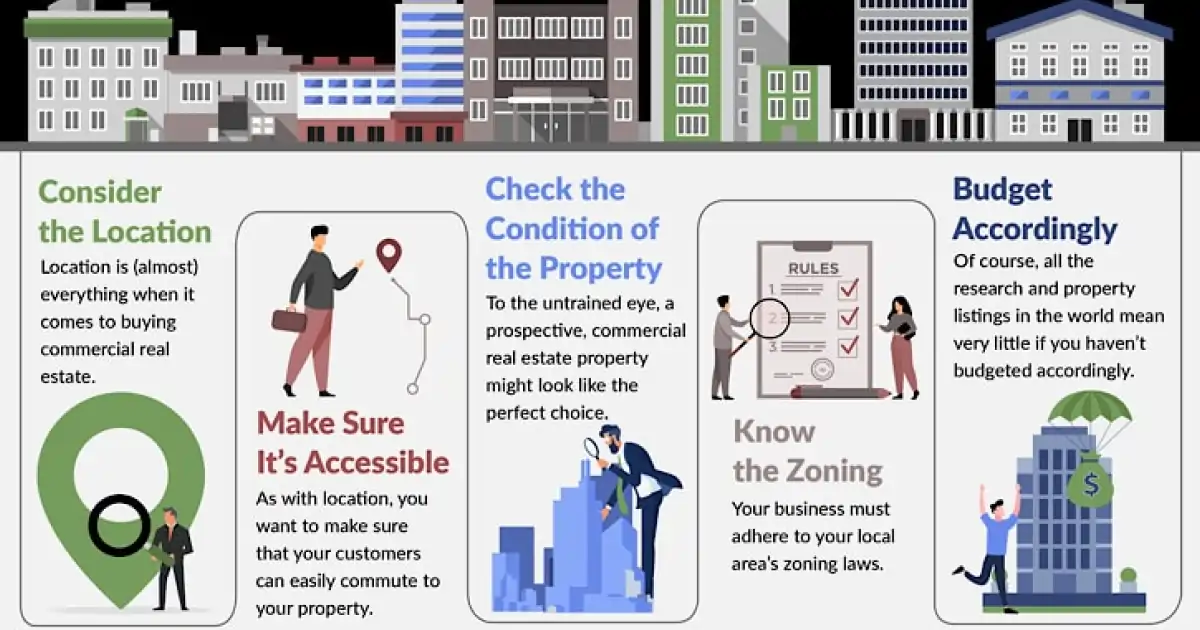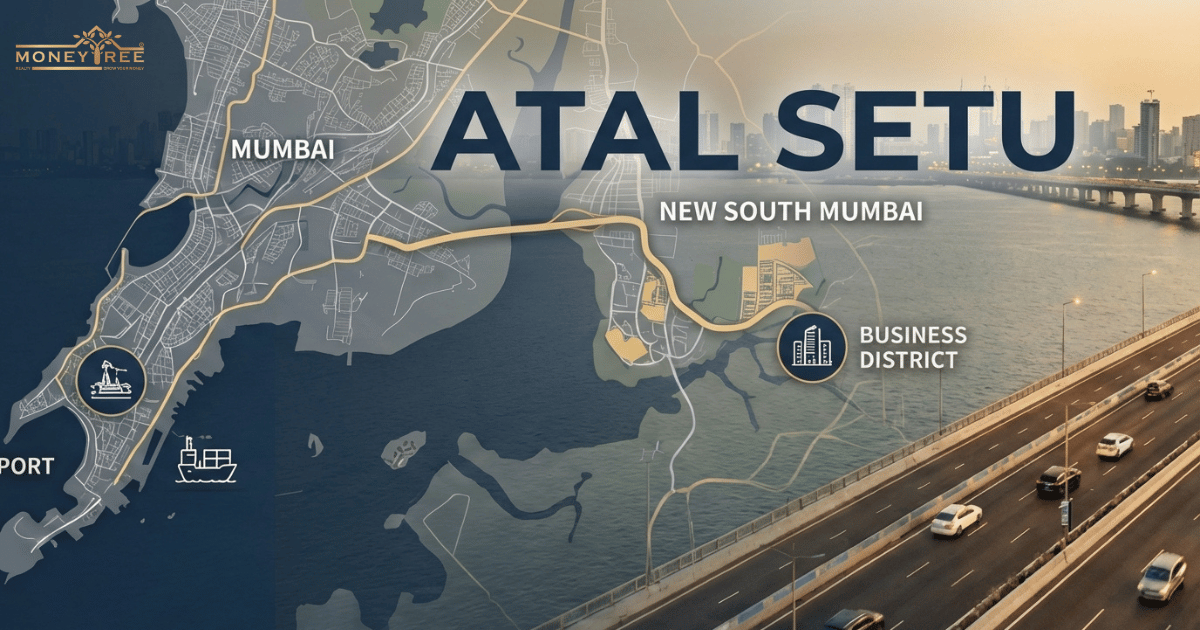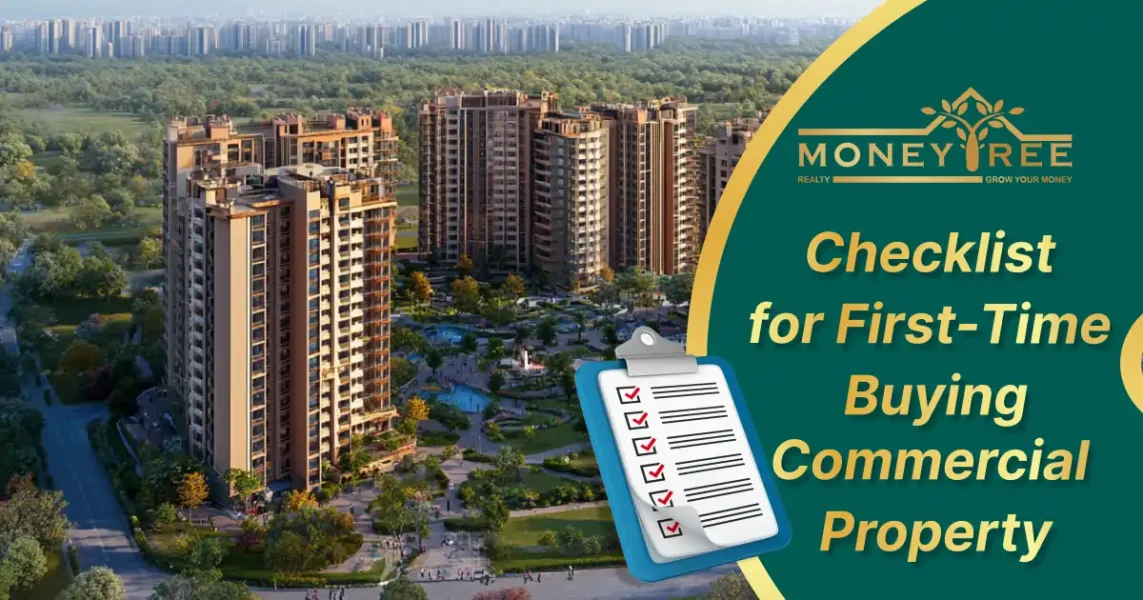Table of Contents
Your initial experience in commercial real estate property buying presents complex challenges but applying proper methods leads to valuable outcomes. The collection of market trends with the necessary knowledge about legal documentation allows you to make wise investment choices.
Commercial Property Buying Guide: Where to Start?
The first-time ownership experience of commercial property brings mixed emotions of thrill and intimidation. Your success when purchasing any commercial property at first depends on developing a strategic plan. This step-by-step guide supports new commercial purchases through an efficient process which minimizes unwanted financial losses.
How to Buy Commercial Property: A Step-by-Step Guide
Buying Commercial Property for Beginners: What to Expect
Your initial experience in commercial real estate property buying presents complex challenges but applying proper methods leads to valuable outcomes. The collection of market trends with the necessary knowledge about legal documentation allows you to make wise investment choices.
Beginners who aim to purchase commercial property need to understand several important factors:
First-Time Commercial Buyers Checklist: Key Essentials
People purchasing commercial real estate for the first time must develop detailed preparation and systematic methods before making their investment decisions. The checklist includes all essential points which will lead you to achieve effective commercial property purchase outcomes.
Commercial Real Estate Checklist: Must-Have Insights
Commercial Property Inspection Checklist for Risk-Free Deals
A complete inspection of commercial properties must occur before property purchase decisions to prevent both hidden costs and legal problems.

Commercial Property Investment Strategy: Long-Term Growth
The process of building wealth through commercial real estate investing needs an organized approach for achieving outcomes. Commercial property investment success through time depends on two factors: picking suitable properties in addition to risk management and market shift recognition.
The following essential approaches will lead to sustainable returns.
Choose the Right Property Type
Various commercial property segments—beginning with retail stores and continuing to offices, warehouses, and multi‑family residential properties—present distinctive investment opportunities with their own profit and risk profiles.
Study current customer demand patterns in your target market area when selecting your property type.
Location is Everything
Select properties situated in areas demonstrating high demand, strong economic growth, robust infrastructure, and tenant interest.
Proximity to transportation hubs, business districts, and commercial centers tends to boost property values.
Secure Favorable Financing
Analyze lenders and financing options to minimize financial costs by comparing interest rates and repayment structures.
Consider strategic financing plans with longer terms and lower risk for better cash flow management.
Lock in High‑Quality Tenants
Stable cash flow relies on tenants with long‑term lease commitments.
Triple Net (NNN) leases offer additional protection, as tenants assume responsibility for taxes, insurance, and maintenance.
Diversify Your Investment Portfolio
Spread risk by investing in multiple property types across different locations rather than relying on a single asset.
Consider Real Estate Investment Trusts (REITs) for indirect exposure to commercial real estate.
Plan for Professional Property Management
Effective management preserves property value and ensures tenant retention.
An experienced property management firm can handle leasing, maintenance, and legal compliance smoothly.
Regularly Monitor Market Conditions
Track trends in interest rates, inflation, supply‑demand dynamics, and economic indicators.
Update your investment strategy in response to shifting market and economic conditions.
Through proper implementation of these measures investors will achieve sustainable expansion together with elevated financial return from their commercial assets.
First-Time Commercial Real Estate Investors: Common Mistakes to Avoid
New investors fail to perform well in the business because they lack experience. Beginners in commercial real estate investment should avoid these main errors:
Important Documents for Commercial Property Transactions
The process of purchasing commercial property demands numerous legal papers for complete compliance and investment protection. The essentialness of proper documentation becomes vital regardless of your experience in buying property.
A complete set of necessary documents exists for accomplishing commercial property deals without complications.
Title Deed and Ownership Documents
The document verifies who owns the property legally. The property title must not contain any disputes or encumbrances or legal claims against it.
Sale Agreement
The sale agreement defines all essential terms whereby the buyer agrees to pay a set price through specified installment payments to gain property ownership. Both parties who exchanged the documents need to provide their signature for authentication.
Property Tax Receipts
Description showing that the seller completed full payment of property taxes through the time of deal completion. It helps avoid future liabilities.
Zoning and Land Use Permits
The verification process checks whether the property satisfies the requirements according to local zoning ordinances. The proper understanding of zoning rules reveals the potential business and industry along with other commercial applications of the property.
Approved Building Plan
Building authorities verify the legal construction and compliance with all mandated building codes in the property.It is issued by local municipal authorities.
Occupancy Certificate (OC)
The certificate ensures both safety standards and all occupancy regulations are met by the building. The certificate becomes necessary for both leasing or property usage.
Encumbrance Certificate
This document demonstrates that the property contains no legal or financial problems or obligations. The property should not hold any pending loans or claims according to the certificate.
Lease Agreements (If Tenants Occupy the Property)
This document defines the leasing period along with rental fees and specifies what tenants must do. The examination needs to take place prior to procuring a leased property.
No Objection Certificates (NOCs)
Required from various authorities like the fire department, pollution control board and local governing bodies. The documents verify that all property operations follow established safety and environmental regulatory requirements.
Loans documents (If the purchase requires financial assistance).
Mortgage agreements together with loan approval letters and repayment schedules form part of this section. The documents provide necessary information to track your payment responsibilities from the purchase.
Insurance Papers
This document gives coverage for property insurance protection against both natural disasters and fire and property destruction. The investment obtains defense against unexpected dangers.
Environmental Clearance (If Applicable)
The purchase of real estate in environmentally sensitive areas demands an environmental clearance. The property must adhere to all environmental laws issued by government authorities.
Risk-free commercial purchases require pre-purchase verification of all documentation to prevent legal problems and establish transaction security.
We at MoneyTree Realty got you!
We at MoneyTree Reality got you!
We're a trusted real estate consultancy in Delhi/NCR, dedicated to transform your property search into a seamless experience.
Your Dream Space, Our Expertise
With over 300 skilled consultants, we offer a diverse portfolio of residential and commercial properties, carefully curated to meet your unique needs.
Partnering for Success
We've built strong relationships with industry giants like DLF, Tata, and Godrej, ensuring access to exclusive projects and unmatched expertise.
You Come First
At MoneyTree Realty, client satisfaction is our top priority. We harness technology to streamline your property journey, ensuring transparency, efficiency, and peace of mind.
A Track Record of Excellence
With over 10,000 delighted investors and a legacy of successful transactions, we're committed to setting new standards in Indian real estate.
Empowering Your Future
Join the MoneyTree family and discover a refreshing approach to real estate. Let's grow together.
Frequently Asked Questions







